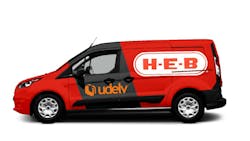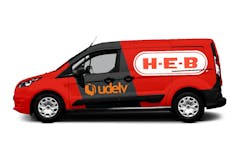2019 Automated Vehicles Symposium in Orlando, Florida
In this week’s roundup from the Association for Unmanned Vehicle Systems International, which highlights some of the latest news and headlines in unmanned vehicles and robotics, the 2019 Automated Vehicles Symposium highlights safety concerns, supermarket delivery drones, and Involi and AirMap team up for a new UAS management platform.
Speakers kick off AVS 2019 with emphasis on automated vehicle safety
The 2019 Automated Vehicles Symposium kicked off on Tuesday with a focus on safety, as speakers from across the industry — and the world — addressed how their companies are building safe self-driving vehicles and working to educate the public about the technology.
Chris Urmson, cofounder and CEO of automated vehicle technology company Aurora, was the first keynote speaker and described how the industry has progressed during his time in it. In the early and mid 2000s he was part of the Carnegie Mellon team competing in DARPA's robotic road races, where his vehicle sometimes found itself upside down.
A decade or so later, when he headed up Google's self-driving efforts, the company enabled a legally blind man to run errands in a self-driving car, illustrating how far and fast the technology had progressed.
The technology has moved "from vehicles driving across the desert, looking like Frankencars, to billions of dollars of investment" and self-driving cars nearing production.
Before that happens, there has to be a focus on safety, Urmson said, including a need to define exactly what that means.
"To us, it means being free of unreasonable risk," he said. "If you'd like a perfectly safe car, park it in your garage and wrap it up in bubble wrap."
Aurora is focusing on several aspects of safety. As an example, Urmson described the company's work on defining a self-driving car's behavior around yellow lights — when should it go through, and when should it stop?
"This is not about being first for being first's sake, but we have to be safe in bringing this technology to the market," he said.
For example, the company's car operators are put through a six-week training program and are employees, not contractors.
"We don't view them as expendable," he said. "We don't just set them loose on the road and hope it all works out."
Any employee can ground the fleet for any reason, he said, citing one instance where engineers noticed that Aurora's cars were failing to see oncoming traffic between 60 and 80 meters away due to a bug in a software update. The vehicles were pulled off the roads until that was fixed.
H-E-B, Udelv launching pilot program to test deliveries via autonomous vehicle
In partnership with Udelv, San Antonio-based supermarket company H-E-B has announced plans to launch a pilot program later this year to test a delivery service that uses an autonomous vehicle.
H-E-B will use an autonomous van from Udelv to serve customers near its Olmos Park H-E-B, which is just north of downtown San Antonio.
“At H-E-B, we continue to evaluate and utilize innovative technologies in all parts of our business,” says Paul Tepfenhart, senior vice president of Omnichannel and Emerging Technologies at Central Market and H-E-B.
“As a leading digital-retail leader in Texas, we will continue to grow our Partner population as well as technology presence to complement our store operations, enabling customers to choose how they shop, pay for and receive products.”
Capable of traveling at city street and highway speeds, Udelv's autonomous delivery vehicle features climate-controlled compartments that can hold multiple orders of fresh, frozen and dry goods.
During the first phase of the pilot, a driver will be present in the autonomous delivery vehicle. If the initiative expands, H-E-B will implement what it calls a “multi-phased” roll out to give the technology time to learn the safest, most efficient routes, which will lead to the vehicle eventually operating without a driver.
For the pilot, select customers can sign up to receive deliveries from Udelv's vehicle during the test period.
“Companies like H-E-B are taking the first steps to explore the benefits autonomous deliveries can bring to their customers and employees,” says Daniel Laury, CEO of Udelv.
“As the most loved retailer in Texas, H-E-B is an amazing partner for Udelv as we scale our Autodeliv service and work to make deliveries faster and safer. We look forward to serving the people of Texas with Newton, our second-generation ADV.”
Involi, AirMap developing pre-integrated UTM and Air Traffic Awareness platform
Involi, a provider of air traffic data for UAS, is partnering with AirMap to develop a pre-integrated UTM and Air Traffic Awareness platform for safe, efficient, and scalable UAS operations.
By combining its low-altitude air traffic data service with AirMap’s drone traffic management platform, Involi says that the companies can facilitate safe, complex, and autonomous UAS applications such as drone delivery, large-scale agriculture support, surveying and mapping.
“It was a natural progression for Involi and AirMap to formalize their ongoing technical integration,” says Involi CEO and co-founder Manu Lubrano.
“We are working toward the common goal of automating drone flights and enabling exciting advanced drone applications that offer tremendous economic potential and represent the future of transportation. Joining forces helps bring this future one step closer.”
Involi and AirMap’s integrated platform provides UAS pilots, authorities, and enterprise customers with a suite of UAS management and flight awareness technologies and services. With AirMap’s UAS Traffic Management (UTM) Platform and UAS Service Provider (USP) capabilities, airspace authorities can provide safety-critical services to UAS operators, as well as others operating in low-altitude airspace.
Involi, a UTM Supplemental Data & Service Provider (SDSP), notes that its stream of low-altitude air traffic data is combined with other traffic data inputs within the AirMap UTM Platform, providing a complete visualization of real-time air traffic. This traffic data is collected through Involi’s network of detection devices affixed to cell towers and other existing ground infrastructure.
Aircraft identification signals such as ADS-B, FLARM, and other transponders are captured using Involi’s technology, providing a comprehensive air traffic awareness. This is important for ensuring safe separation and deconfliction between UAS operations and helicopters, gliders, and other low-altitude manned aircraft.
“Through this collaboration, AirMap and Involi offer a comprehensive UTM solution that incorporates real-time data from aircraft operating in low-altitude airspace using ADS-B and other identification technology,” says AirMap CTO Andreas Lamprecht.
“Involi’s airspace data will further enhance situational awareness within the AirMap UTM Platform.”
Share your vision-related news by contacting Dennis Scimeca, Associate Editor, Vision Systems Design
SUBSCRIBE TO OUR NEWSLETTERS


